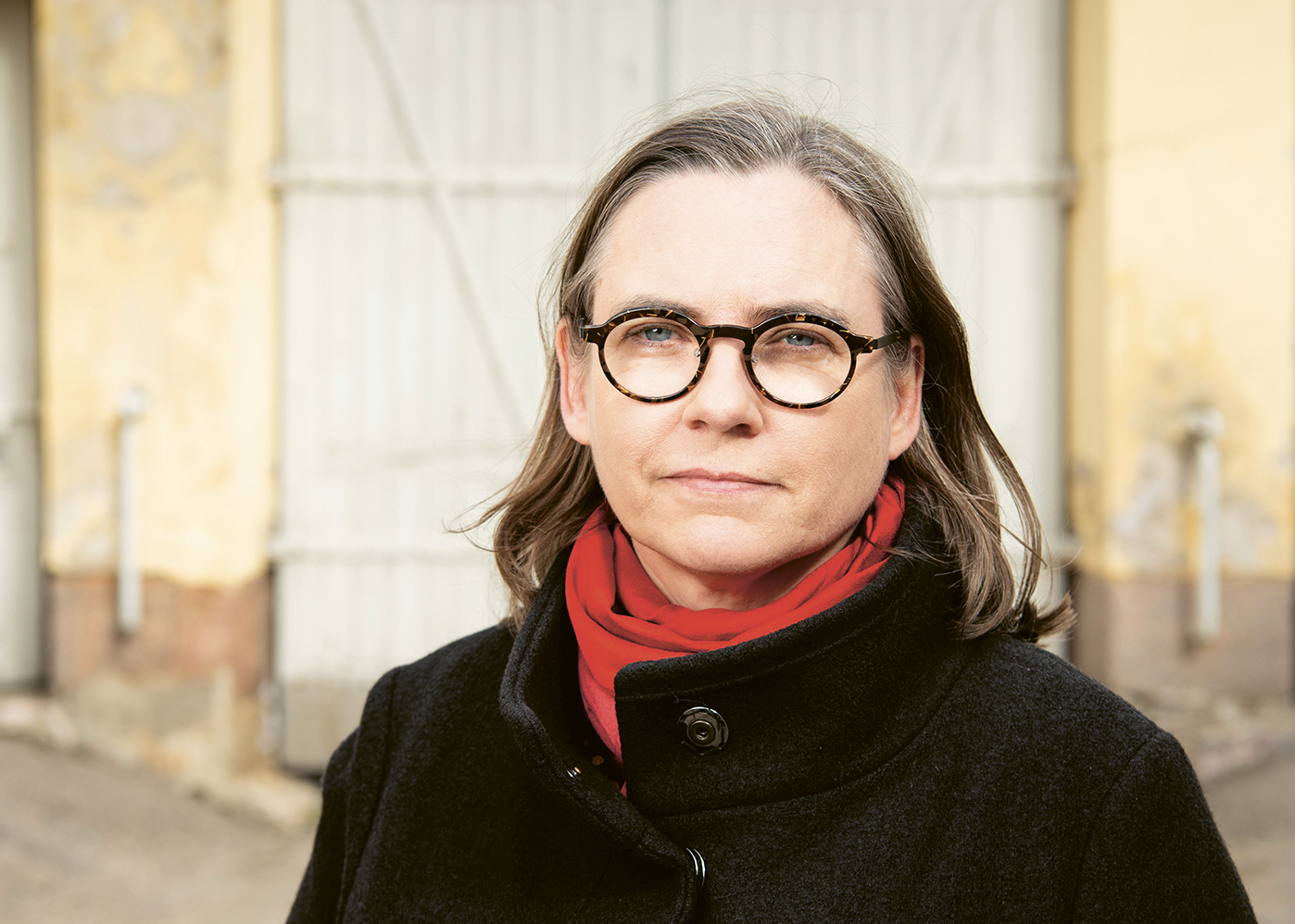
Putting linguistics to use
Anna Solin is confident that languages can be used in parallel – including in university administration.
Text Tuomo Tamminen Images Veikko Somerpuro
When Anna Solin was five years old, her classical scholar father became director of Villa Lante, home to the Finnish Institute, in Rome. Upon arrival, Anna and her brother were placed in a German-speaking kindergarten among Italian-speaking children.
Solin’s memories of those years in the late 1970s are shaky but sunny. Italy was ravaged by student riots and both far-right and far-left terrorism, but the Finnish children were largely unaware of such turmoil. They quickly learned both German and Italian and often even played at home while speaking Italian.
“I wonder how I managed, but I don’t remember feeling anxious about it,” Solin says.
She was eight when the family returned to Finland, but after that it was easy to learn other languages. For her, languages have always been a currency that does not lose value. She is also not worried about Finnish being overrun by English and believes that other languages can coexist alongside Finnish.
“I’m not worried about Finnish being overrun by English and believe that other languages can coexist alongside Finnish.”
Anna Solin
However, what works for a five-year-old child may not apply to a large organization.
Consideration of everyone’s language skills
Solin participated as an expert in a working group at the University of Helsinki, which in April submitted its recommendations for the language practices of the university’s board, collegium and faculty councils, as well as the boards of independent institutions.
The working group recommended that the various organs draw up agendas and minutes in English, in addition to Finnish or Swedish. Members’ language skills should be considered when deciding on the languages spoken at meetings.
In this we are talking about the parallel use of languages. The university is becoming more international, and new employees cannot be expected to immediately have proficient Finnish or Swedish skills. These employees want to be involved in decision-making; however, it is clear that universities cannot produce every single instruction, bulletin, memorandum and protocol in a variety of languages. A reasonable solution has to be considered.
The university is becoming more international, and new employees cannot be expected to immediately have proficient Finnish or Swedish skills.
Solin’s expertise was called for, because English as the administrative language of universities has been studied very little – and that is Solin’s research interest. Solin is a university lecturer in applied linguistics and is leading a research project on language regulation in academia, funded by the Kone Foundation.
Language matters
Solin has studied administration at the universities of Helsinki and Stockholm, where they face similar issues in their language cultures. Solin thinks that Nordic universities are “way ahead” of other European universities in terms of their approach to multilingualism. In Sweden, however, the language policy of universities is dictated by the Language Act, which which sets strict conditions for language choice.
Nordic universities are “way ahead” of other European universities in terms of their approach to multilingualism.
“A central question in our project is how top-down regulation relates to everyday language use. Very few staff members are in favor of the kind of rigid language policy where you have to use multiple languages, even if the situation doesn’t require it.”
However, Solin felt that university-level recommendations were needed, as parallel use of language inevitably requires effort and resources, even if implemented flexibly. And it can’t always be flexible.
Solin uses the translation of the word “johtosääntö” as an example. In the University of Helsinki’s own terminology, the English translation is regulation. The Ministry of Education and Culture has also used the term university rules of procedure. Google Translate offers the word bylaws.
“Some people might think that it doesn’t matter – everyone understands what is being talked about. But many administrators believe that faculty councils make such important decisions that the quality of the language is not a trivial issue,” Solin says.

A lively English department
It is by coincidence that Solin became an English scholar. She was accepted to the University of Helsinki to study English, German and Spanish, but it was English that which won her over.
“The English department was fun. There was a good vibe and lots happening.”
There were, for instance, plays and poetry evenings with fellow students and teachers. One lecturer taught Welsh in his spare time on Monday evenings.
“Then I went off to study in the UK on two separate occasions and was impressed with university life there. I had really positive experiences, and now I’m here.”
Solin sometimes worries that English is too dominant in her work life – there just isn’t time for everything.
However, Solin sometimes worries that English is too dominant in her work life – there just isn’t time for everything. A good command of English, of course, helps a lot in academia, but sometimes she longs to follow her teenage daughter, who studies many languages and is “really excited.”
Can a teacher do research?
In the early years of the research project, Solin herself did not have time to do research separate from her other work, but in the summer of 2021 she received a one-year fellowship that has allowed her to to make time for research. When it runs out, she will return to the position of university lecturer, where there is little time for research – even though teachers’ duties include research.
Solin feels that arranging research time should not be an issue for lecturers themselves to deal with alone. For students’ sake, it is important for teachers to have time to do research and thereby offer master’s degree topics borne out of real research projects.
“It’s very common for university lecturers to grumble about having no time to be the researcher they once were.”
“It’s very common for university lecturers to grumble about having no time to be the researcher they once were.”
Anna Solin
At the moment, however, Solin would most like to set up a development project to implement the new language recommendations of the University of Helsinki. The results will certainly be monitored at other universities as well.
“It’s a problem if language issues don’t get talked about and there is no discussion about who should do the translation work. If all of a sudden there’s some order from above saying you should produce all these language versions, people in admin might feel that they don’t have the time or the competence or the resources to do that. What I’d like is to act as a facilitator and mediator to help spread good practice.”
Anna Solin, university lecturer
- Born: In Helsinki in 1970
- Family: Spouse and teenage twins
- Job: Lecturer in Applied Language Studies at the University of Helsinki, Title of Docent in Discourse Studies at the University of Jyväskylä
- Education: PhD in Linguistics, Lancaster University, UK
- Hobbies: Music, especially choral singing, and Pilates
